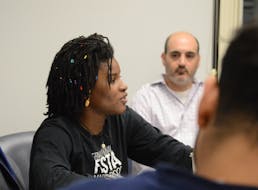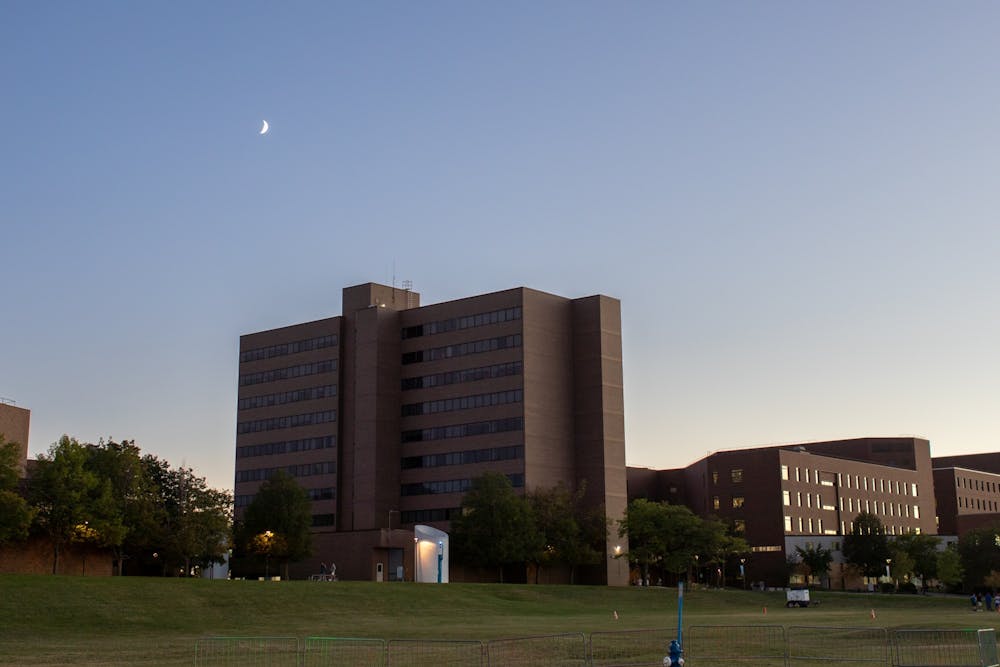When Stanley Chen became the UB Badminton Club’s secretary in the fall of 2022, he was essentially starting from scratch. A previous club e-board failed to request a budget from the undergraduate Student Association (SA), leaving the club with just $200 in leftover fundraising proceeds — nowhere near enough to obtain the equipment or practice space its players needed.
So Chen and the rest of the e-board set about searching for money. He considered asking the SA Senate for supplemental funding, but the intricacies of SA’s tier system, the requirement for exact itemization and the prospect of intense questioning intimidated the club’s inexperienced e-board.
Then, badminton-loving dentistry professor Dr. Praveen Arany tipped Chen off to easy money. A Council of Advocacy and Leadership (COAL) programming grant carried few restrictions, no exact itemization and no nerve-wracking presentation — and it offered as much as $45,000, many times higher than what the SA Senate was likely to provide.
Chen applied for $14,853.65. To his surprise, the full amount was approved. About a month later, enough money remained in the fund that COAL launched a second round of applications.
When Chen heard of the second round, he went all in. He applied for as much money as he could use: $40,781.14, in total.
“We just maxed out on everything, so we could get the most funding out of it,” Chen said. “I thought they would give us, at most, $7,000. Like, they’ll never go that crazy.”
$15,224 later, COAL proved him wrong.
Chen and club treasurer Mahmud Amin got to work: they bought supplies, booked practice space and arranged orders for large quantities of badminton equipment, all pending COAL’s reimbursement.
But the money didn’t come so easily.
COAL grants aren’t delivered directly to clubs’ accounts; instead, student governments are on the hook for the initial cost and must apply for reimbursement from COAL. And COAL’s freewheeling approach, which calls only for rough estimates of program costs, differs widely from student governments’ more exact spending policies. SA, for instance, requires clubs to order through approved vendors and submit an accurate accounting of their expenses.
But Chen and Amin were assured that since the COAL grant was not SA money, they could follow the grant’s guidelines, which state, “Your estimations do not need to be perfectly accurate to what you will potentially be spending.”
Amin spent $900 of his own money on supplies, and the club signed a $3,000 contract for practice space at Rally Niagara in Williamsville. Months later, the money still had not come through — and SA officials didn’t know how to reconcile SA’s policies with COAL’s lack thereof.
Though Amin and Rally Niagara were eventually reimbursed, $9,800 worth of nets, shuttlecocks, bags and racquets were never paid for and never arrived.
Chen says getting answers from COAL was nearly impossible. His e-board members found themselves chasing the sound of then-COAL chair A.J. Franklin’s distinctive boomboxes, Chen says — but even after speaking with him, the situation was far from clear.
“He would just tell us, ‘Oh, this is just SA,’ and then when we go to SA, they’ll just be like, ‘This is not our money. This is the COAL people,’” Chen said.
In the end, the UB Badminton Club was able to use much of its COAL grant — but not before angering many of its vendors.
“Some of them were mad, and some of them were understanding. But at the end of the day, we didn’t get anything out of it, and SA just got a lot more trouble,” Chen said. “It was not a fun experience.”
An advocacy committee thrust into an unfamiliar role
While the University Archives contain no records of COAL’s founding, mentions of the group began to appear in The Spectrum in 2013.
But for most of its existence, COAL’s role was limited to advocacy.
The Faculty Student Association (FSA), the private nonprofit that manages Campus Dining & Shops, created a “programming fund” in 1988, using proceeds from a 1987 land sale. Since FSA originally purchased the land in 1964 using money from student activity fees, FSA allowed grant funding decisions to be made by Sub-Board I (SBI), the student-run fiscal agent that managed student government funds from 1970 until its controversial demise in 2019.
After SBI dissolved, FSA took over student governments’ finances. Wanting to keep students in charge of grant decisions, FSA granted control to the only remaining body that included all student governments: COAL.
The 2022-23 academic year was COAL’s first time managing the grant. Strong investment returns, combined with the funds that had built up in the account since SBI’s dissolution, left the body with over $400,000 to award to clubs that year — an order of magnitude higher than the approximately $60,000 that was available in the 2018-19 academic year, the last time SBI administered the grant.
COAL, which is not formally incorporated, is a coalition of eight student government leaders — from SA, the Graduate Student Association (GSA) and the associations governing clubs in the law, pharmacy, medical, dental and management schools. Last year, COAL added the Residence Hall Association (RHA), which represents UB’s nearly 7,500 on-campus residents, as a non-voting member.
The body is chaired by the University Council Student Representative, who represents UB’s 30,172 students in university affairs. Today, Alika Turton, a junior political science and communication major, holds that position.
“Between a rock and a hard place”
In a telephone interview, Franklin — who held the position last year — said he worked with all of COAL’s members to make sure grants were awarded objectively.
“Alika is doing a great job, I’m sure,” Franklin, also a former Spectrum features editor, said in a telephone interview. “When I was in the role, I made sure to — even with the tensions, with the legal aspect around it — I made sure to still resolve that issue no matter what.”
But SA President Becky Paul-Odionhin says it was the extra cash — not Franklin’s leadership — that allowed the group to give almost every applicant money. Under Franklin, she says, COAL avoided dealing with fundamental issues in how the body selects grant recipients.
“An advantage of A.J.’s year was that we had a lot of money. So some of the issues were able to be compensated for slightly by the fact that there was so much available,” Paul-Odionhin told The Spectrum.

SA President Becky Paul Odionhin speaks during an SA senate meeting.
But this year, COAL wasn’t swimming in cash anymore: clubs requested around half a million dollars, Paul-Odionhin says, out of a $242,693.23 budget. That left members with the unfamiliar task of choosing which clubs to fund — and which to reject.
The COAL grant guidelines delineate broad requirements: proposals should “enhance the quality of the university experience” for a large number of students, be managed by a student government that does business with FSA, and include cost and revenue estimates “based off the best of your knowledge,” among other things. The guidelines also set out grounds for automatic rejection.
But once ineligible applications have been filtered out, there are few objective criteria to narrow the field.
Paul-Odionhin, the only incumbent in this year’s council, says that instead of planning ahead, COAL members allowed applications to go forward without concrete criteria.
“There was less money in the pool, because some of the money had gone out in A.J.’s year, so it was more important that we figured out a good way of sharing it,” Paul-Odionhin said. “The guidelines alone aren’t able to lead us to decisions, and so the addition of extra steps to that is where it started to break down.”
Faced with a flood of requests that far outmatched the grant’s resources, COAL members began to suggest desperate measures, Paul-Odionhin says. She recalled one proposal to accept applications solely based on the order in which they were submitted, which would have led to on-time applications being rejected.
The tipping point came when she was asked to rank which proposals she thought should receive funding — a task she says would have violated SA’s requirement to fund clubs in a viewpoint-neutral way.
Finding herself “between a rock and a hard place,” Paul-Odionhin left COAL, pulling SA out with her.
COAL keeps quiet
After SA exited, COAL rejected all grant applications from the undergraduate student clubs SA represents. Turton, COAL’s current chair, has so far offered no public explanation for the decision. She has canceled or ignored 17 attempts to schedule an interview with The Spectrum since November 2023.

Alika Turton listens in on a UB Council meeting.
With undergraduate clubs off the docket, COAL awarded grants to all of the remaining applicants — and had $91,511.76 left over.
Paul-Odionhin says that since undergraduate students compose an overwhelming majority of UB’s student body, their applications should be considered. She also thinks the COAL grant process should be independently audited.
“They definitely need someone to come in and determine how it’s going to go. It shouldn’t be nine clueless students,” Paul-Odionhin said. “Ideally, an external party who knows things should come in and audit to see if it’s working properly — but nobody’s really in charge of making that happen.”
While FSA has the final say over how grant money is disbursed, it has avoided inserting itself in the decision-making process. Tom Vane, UB’s non-voting delegate to COAL, also stays out of grant deliberations. He says that as a UB employee, “it would be inappropriate” for him to take part in the student-led process.
It’s unclear how this year’s vastly reduced applicant pool has affected non-SA clubs’ applications. When asked by The Spectrum for a list of this year’s COAL grant recipients, GSA President Isaac Kolding said on April 3 that “another COAL member” told him not to provide the list until the body’s April 11 meeting, which was not open to the public.
On April 4, The Spectrum filed a public records request under New York’s Freedom of Information Law (FOIL), asking for meeting minutes, correspondence and documents relating to COAL grant deliberations and decisions.
UB expects to respond to The Spectrum’s FOIL request by Wednesday, May 8.
At COAL’s April 11 meeting, COAL’s members voted to compel Turton to share grant information with The Spectrum. On Sunday, Turton emailed The Spectrum a spreadsheet listing this year’s COAL grants.
The spreadsheet only included accepted applications, leaving out the undergraduate clubs’ applications that were automatically rejected after SA left COAL. A column labeled, “Application Completed,” is redacted, as well as applicants’ account numbers. While the spreadsheet Turton provided appears to contain a list of hyperlinks, labeled, “Link with grant info,” the ostensible links are actually non-clickable underlined blue text.
Though Turton also provided a blank copy of the COAL grant application form, which is publicly available, and a brief statement reiterating several of the policies noted in the application, she did not respond to follow-up questions.
Turton is running for re-election to the University Council for the 2024-25 academic year. Jack Walsh, better known as “u/Ill_Muscle_6259” on the UB Reddit forum, and RHA President Cameron Kiner are challenging her for the position. Elections will take place on UBLinked between Monday, April 22, and Wednesday, April 24.
Despite the UB Badminton Club’s trouble using its COAL grants, the money allowed the club opportunities it wouldn’t have otherwise had. The club formed a competitive team last year, which placed first in its division in the Eastern Collegiate Championships.
Chen applied for $33,154.64 in grant funding this fall, before SA left COAL. He says he would do it again next year, too, if the opportunity arose.
“Without COAL, we probably wouldn’t have had some of the achievements we had a year ago,” Chen said. “I think, of anyone, undergraduate clubs actually need it more — but I think it just needs to be better managed.”
Sol Hauser is the senior news editor and can be reached at sol.hauser@ubspectrum.com





